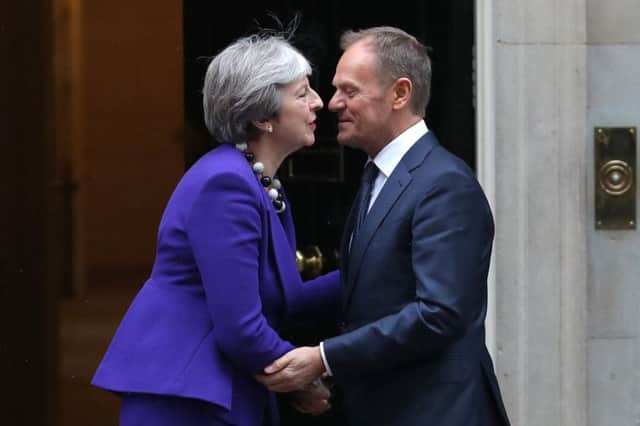EU ambassador to Moscow recalled over Russian nerve agent attack


At the end of the two-day summit in Brussels, European Council president Donald Tusk said the recall of the EU’s ambassador to Moscow for “consultations” would be followed by further action by member states.
French President Emmanuel Macron said France and Germany would be among the countries taking “co-ordinated measures” against Russia, with an announcement due “very shortly”.
Advertisement
Hide AdAdvertisement
Hide AdIrish premier Leo Varadkar said Dublin would be conducting a “security assessment”, with a decision early next week on possible “individual action relating to Russian diplomats in Ireland”.
Latvia’s foreign minister Edgars Rinkevics joined Lithuania in suggesting his country could follow Britain’s lead and “decide on the expulsion of Russian secret service employees working under diplomatic cover”.
The moves came after leaders issued a statement supporting the UK’s assessment that it was “highly likely” Moscow was responsible for the attack on former double agent Sergei Skripal and his daughter, Yulia, and that there was “no plausible alternative explanation”.
It represented a significant hardening of the EU’s position after foreign ministers issued a statement earlier this week expressing solidarity with the UK while stopping short of blaming Russia.
The declaration came as investigators removed the bench where Mr Skripal and his daughter were found.
Scotland Yard said it is being taken to “preserve it as a potential crime exhibit” as part of the attempted murder probe.
Mr Skripal, 66, and his 33-year-old daughter, Yulia, were extremely ill when they were discovered on the park bench in The Maltings shopping centre, in Salisbury, on 4 March.
The bench, a short walk from Zizzi restaurant and The Mill pub, which were both visited by the Skripals, has been cordoned off and covered by a tent since the incident.
Advertisement
Hide AdAdvertisement
Hide AdMrs May, who set out Britain’s case against the Kremlin over dinner last night, welcomed the strong recognition of the threat Russia posed to their collective security.
She said in the run-up to the summit Britain had been sharing what information it could through “intelligence channels” as it sought to make the case for Russian responsibility.
“The threat from Russia is one that respects no borders,” she said.
“I think it is clear that Russia is challenging the values we share as Europeans, and it is right that we are standing together in defence of those values.”
Mrs May’s comments were echoed by Mr Macron, who told a joint news conference with Germany’s Chancellor Angela Merkel: “We consider this an attack on European sovereignty.”
Mr Macron disclosed France had been asked for technical assistance relating to the Salisbury investigation, which it stood ready to provide.
Mr Tusk said the EU response to the incident was “unprecedented” with the next steps by national governments expected as early as Monday.
“It is very difficult to prepare an adequate reaction to this kind of behaviour with nerve agents. We will never have a real chance to respond adequately because we are completely different to the perpetrators of this attack,” he said.
Advertisement
Hide AdAdvertisement
Hide AdMr Tusk expressed satisfaction he had achieved his goal of maintaining a “united” front among the 28 EU member states, despite their different stances towards Russia due to differing geographical positions and political traditions.
“I think it was the best reaction we were able to decide on,” he said.
In a hint at the underlying tensions, he acknowledged that not all member states would be taking further measures. Asked how many might take action, he said: “More than one, but I don’t think it will be the whole group.”
Earlier, British diplomats ordered out of Russia in a tit-for-tat retaliation for Britain’s expulsion of 23 suspected spies, began heading back to the UK.
A convoy of minivans left the British embassy in Moscow today as the deadline for the expulsions was reached.